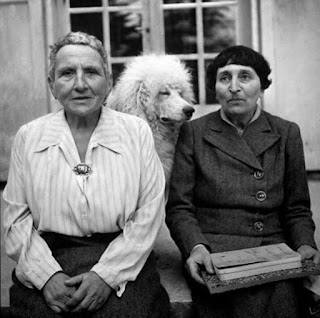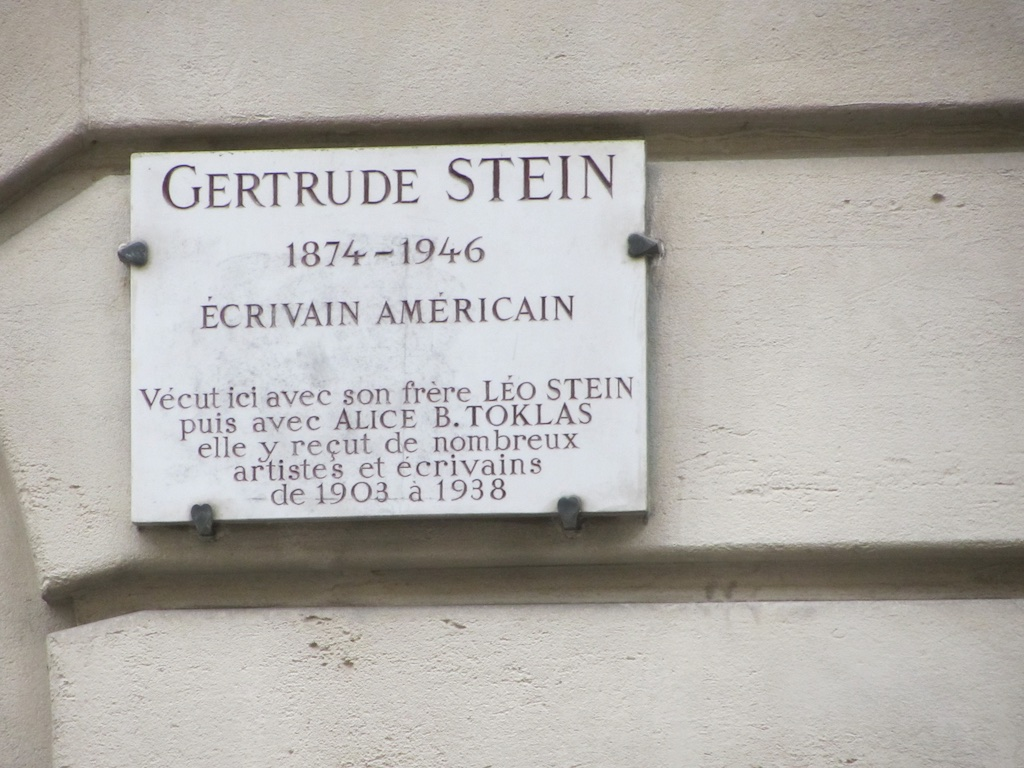When I read historical fiction, I always find myself questioning which parts of the characters' lives are made up and which parts are based on documents or memoirs from the characters. In this case, the cook, whose name is Bình, narrates the book, so there's a great deal that Truong has to invent about his childhood in Vietnam, his job from the age of six as a kitchen boy and then sous chef for in the the Governor-General’s kitchen in Saigon, and his journey to Paris where he worked for Stein and Toklas. He feels that he is looked down on or even hated for two things he can't change: his identity as a Vietnamese, and his identity as a gay man. He particularly narrates his views on cooking and what he cooked on various occasions for his employers, and his love for a particular American man that he called "Sweet Sunday-Man" because that was when they were together.
 |
| Gertrude Stein, Alice B. Toklas, and their dog Basket, who plays a role in The Book of Salt. |
A few of the most luscious food descriptions — which all mention salt, so central to the imagery of the novel:
“She wants an omelet,” says Miss Toklas, who busies herself with the plates, silverware, and tray. Six eggs beaten with a generous pinch of salt until the mixture is thick with air, until the color lightens to the bare yellow of chamomile centers. Two large soupspoons of butter, the first melted in the pan until it sizzles, a harmonic of anticipation. The second is tucked under the puffy skin that has formed in less than a minute, if the heat is just right. A simple dish that reveals the master, exposes the novice. My omelets are well regarded and held in high esteem by all those who have partaken. Like children, gullible and full of wonder, they always ask, “What is your secret?” (p. 153)
“Pré-salé lambs are named for the salt marshes along the northern coast of France where they graze. Saltwater overflows onto flat stretches of land and leaves behind a sweet mix of herbs and flora. Elemental and tender, pré-salé lambs are salted and seasoned from the raw beginning. Now that, Miss Toklas thinks, is forethought. The first bite is a revelation of flavors, infused and deep. The second bite is a reminder of why we kill and eat the young. The third allows the brain back into the fray to ask, But how is it possible? Not a visible grind of pepper, a milky grain of salt, not even the faintest traces of rosemary, wild fennel, or thyme, and yet the lamb gives all this and more. Yes, intrigue is what my Madame aspires to in all of her creations.” (p. 178)
“The true taste of salt—the whole of the sea on the tip of the tongue, sorrow’s sting, labor’s smack—has been lost, according to my Madame, to centuries of culinary imprudence. It is a taste that Miss Toklas insists is sometimes unnecessary, as in the gazpacho of Malaga, and other times, as in the gazpacho of Segovia, it is the hinge that allows the flavors of the other ingredients to swing wide open. ‘In my kitchen, I will tell you when salt is necessary,’ my Madame said, concluding the real lesson for that day.” (p. 210)
While I didn’t like everything about the book, it’s pretty good, and I liked the effort to see Stein and Toklas as Americans with American sensibilities, American prejudices, and American judgements. Mainly, I feel that I should return to some of the books by Stein and Toklas and read them again. And I feel as if I should go back to some of my old French recipes and cook them again. And go back to Paris again, where I often walk past 27, rue du Fleurus and think of Gertrude Stein and Alice B. Toklas.
 |
| The door to Gertrude Stein's house at 27, Rue du Fleurus (from my visit in 2013). |



16 comments:
I recently bought the Autobiography of Alice B. Toklais (haven't read it yet) so I was curious about this post. You must have loved all the food mentions in this book. Can you recommend and Gertrude Stein to read? Happy weekend Mae.
I have often thought about reading this book because of its connection with Paris and with Stein and other writers there. The description of food you share is beautiful.
I'm reading a book on Hemingway right now and she is mentioned in the book. He lived in Paris around the time Gertrude was there. Interesting people back in that time frame.
I like the cover of this one! Have a great weekend!
@Bill -- Yes, Hemingway was one of the frequenters of Gertrude Stein's salon, and she was a mentor when he was first writing. However, his portrayal of her in "A Moveable Feast" wasn't very flattering. Brooks Atkinson, literary critic at the New York Times wrote this about what he said: "His portrait of Gertrude Stein, whose hospitality he frequently enjoyed, is cruel and humiliating, and his portrait of Scott Fitzgerald, a friend, is the same." (NYT Review, 1964)
I was never a fan of Alice and Gertrude but I can see how one could easily be. To imagine a Vietnamese cook in their household and in Paris at this time seems like a great accomplishment for a novel.
I love what can be learned about history through stories. It sounds like this was an interesting read even if you didn't enjoy every part.
Wonderful and honest review of a very sensitive book. I thoroughly enjoyed seeing the various photos you shared, too, including your own experience in Paris.
I shall have to get Dave to try the omelette as written here. I also long to go back to Paris.
In job advertisements you now always find (w/m/d) for female/male/divers, yet people who look or are different still have a hard time.
Ingo just got special salt from Hamburg and we also saw a fairy tale about salt. The King has three daughters and each is to tell him how much he´s worth to them.
The youngest says "salt". He throws her out and salt vanished from the earth. Guess...
Sounds like a fascinating book. I do like that cover, too.
Have a great week!
The book sounds pretty fascinating but I doubt I'd make it through it...short attention span. Ha! Have a good month. My Sunday Salon post
Super book
Another wonderful post. I love how you write.
This sounds like a brilliant read Mae. I will keep an eye out for it. I especially liked the omelette part. I am definitely a novice when it gets to making an omelette... But 6 eggs!!
Lovely and thorough review Mae.
Have a good week!
Elza Reads
Another interesting post Mae! I like the photo of them with their dog Basket. What a name. They are icons.
Post a Comment